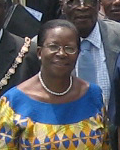Olivia Muchena
| Olivia Muchena | |
|---|---|
 Muchena, June 2006 | |
| Ministry of Higher and Tertiary Education | |
In office 10 September 2013 – December 2014 | |
| President | Robert Mugabe |
| Deputy | Godfrey Gandawa |
| Preceded by | Stan Mudenge |
| Minister of Women Affairs, Gender and Community Development | |
In office 13 February 2009 – 10 September 2013 | |
| Prime Minister | Morgan Tsvangirai |
| Deputy | Evelyn Masaiti |
| Preceded by | Sithembiso Nyoni (Acting) |
| Minister of Science and Technology Development of Zimbabwe | |
In office Unknown – 13 February 2009 | |
| President | Robert Mugabe |
| Succeeded by | Henry Dzinotyiweyi |
| Personal details | |
| Born | 18 August 1946 Mutoko, Southern Rhodesia |
| Political party | Zimbabwe African National Union-Patriotic Front |
| Alma mater | Iowa State University |
Olivia Nyembezi Muchena (born 18 August 1964)[1] is a Zimbabwean politician and the former Minister of Higher Education in the Cabinet of Zimbabwe. She has also served as the Minister of Science and Technology Development and as the Minister of Women's Affairs.[2]
Contents
1 Early life and education
2 Politics
3 Literature
4 Achievements
5 References
Early life and education
Muchena studied at Iowa State University and graduated with a PhD in agriculture and minors in social change and technology.[3] During the late 1970s she was a faculty member at the University of Rhodesia.[4] When Muchena started her career at the University of Zimbabwe in 1983, she held the positions of Deputy Dean and Senior Lecturer. When her position as Deputy Dean ended in 1985, she remained as a lecturer until 1995.[5]
Politics
Muchena had served in various positions in the Zimbabwe government including in the Office of the Vice President and the Ministry of Agriculture.[5] During her position in the Ministry of Agriculture, she was involved in Zimbabwe's land reform process.[6] When the ZANU-PF–MDC national unity government was sworn in on February 13, 2009, Muchena became Minister of Women's Affairs.[7]
In June 2015, Muchena lost her seat in the Senate of Zimbabwe after the ZANU-PF ousted her out for supporting Joice Mujuru, who was formerly the Vice-President of Zimbabwe.[8]
Literature
She contributed the piece "It can only be handled by women" to the 1984 anthology Sisterhood Is Global: The International Women's Movement Anthology, edited by Robin Morgan.[9]
Achievements
Muchena has received multiple awards including a scholarship from the Africa-America Institute and a fellowship from Kellogg International.[5]
References
^ "EO 13288 Block Proeprty of Persons Undermining Democraftic Processes or Institutions in Zimbabwe". nodis3.gsfc.nasa.gov. Retrieved 17 November 2016..mw-parser-output cite.citation{font-style:inherit}.mw-parser-output q{quotes:"""""""'""'"}.mw-parser-output code.cs1-code{color:inherit;background:inherit;border:inherit;padding:inherit}.mw-parser-output .cs1-lock-free a{background:url("//upload.wikimedia.org/wikipedia/commons/thumb/6/65/Lock-green.svg/9px-Lock-green.svg.png")no-repeat;background-position:right .1em center}.mw-parser-output .cs1-lock-limited a,.mw-parser-output .cs1-lock-registration a{background:url("//upload.wikimedia.org/wikipedia/commons/thumb/d/d6/Lock-gray-alt-2.svg/9px-Lock-gray-alt-2.svg.png")no-repeat;background-position:right .1em center}.mw-parser-output .cs1-lock-subscription a{background:url("//upload.wikimedia.org/wikipedia/commons/thumb/a/aa/Lock-red-alt-2.svg/9px-Lock-red-alt-2.svg.png")no-repeat;background-position:right .1em center}.mw-parser-output .cs1-subscription,.mw-parser-output .cs1-registration{color:#555}.mw-parser-output .cs1-subscription span,.mw-parser-output .cs1-registration span{border-bottom:1px dotted;cursor:help}.mw-parser-output .cs1-hidden-error{display:none;font-size:100%}.mw-parser-output .cs1-visible-error{font-size:100%}.mw-parser-output .cs1-subscription,.mw-parser-output .cs1-registration,.mw-parser-output .cs1-format{font-size:95%}.mw-parser-output .cs1-kern-left,.mw-parser-output .cs1-kern-wl-left{padding-left:0.2em}.mw-parser-output .cs1-kern-right,.mw-parser-output .cs1-kern-wl-right{padding-right:0.2em}
^ "PRINCIPAL OFFICERS OF THE SENATE AND HOUSE OF ASSEMBLY". .parlzim.gov.zw. Archived from the original on 28 September 2011. Retrieved 6 February 2008.
^ "Mugabe appoints first female higher education minister". University World News. No. 117. 14 September 2013. Retrieved 17 November 2016.
^ Kumambura, Andrew. "Ex-Minister homeless". financialgazette.co.zw. Retrieved 17 November 2016.
^ abc "Olivia Muchena". whoswho.co.za. Retrieved 17 November 2016.
^ "World: Africa Zimbabwe to seize white-owned land". news.bbc.co.uk. Retrieved 17 November 2016.
^ "Cabinet sworn in amid chaotic scenes". newzimbabwe.com. Archived from the original on 14 February 2009. Retrieved 16 November 2016.
^ Langa, Veneranda. "Mavhaire, Muchena booted out of Senate". thestandard.co.zw. Retrieved 16 November 2016.
^ "Table of Contents: Sisterhood is global :". Catalog.vsc.edu. Retrieved 15 October 2015.